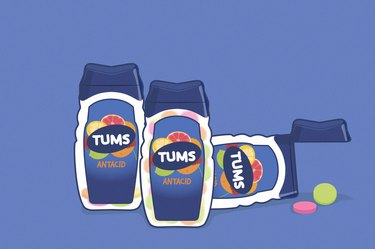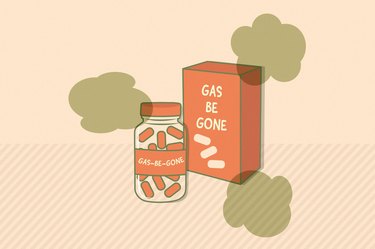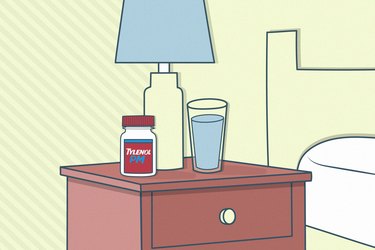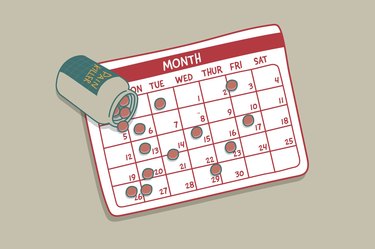
When heartburn strikes, many of us reach for Tums. And for good reason: These tried-and-true antacids supply instant relief from the burn (and other GI woes, such as a sour stomach and indigestion). But are Tums safe to take every day?
While Tums antacids are considered generally safe, popping them like candy might do you more harm than good in the long run.
Video of the Day
Video of the Day
Here, gastroenterologist Elena Ivanina, DO, MPH, curator of gutlove.com and founder of the Center for Integrative Gut Health, explains the possible side effects of excessive use and how often you can take Tums for tummy troubles without jeopardizing your health.
Warning
Always speak with your doctor before taking Tums, as the antacid — which contains the active ingredient calcium carbonate — may interact (or interfere) with other medications and dietary supplements, per the Cleveland Clinic.
First, How Do Tums Work?
Tums' soothing action takes effect in seconds. But how does it halt heartburn so quickly? The secret to the antacid's fast acting relief is its primary active ingredient — calcium carbonate.
"Calcium neutralizes the acid — which causes heartburn in your esophagus — on contact," Dr. Ivanina says.
"In addition, studies have shown that the calcium released after chewing calcium carbonate antacids may improve esophageal motility," she adds.
Here's why that matters: "One of the most important jobs of the esophagus is to function as a muscle to move food forward," Dr. Ivanina says. In other words, when your esophagus is functioning optimally, food travels in the right direction (i.e., it doesn't come back up).
As calcium carbonate promotes healthy motility, it also helps to clear acid from the esophagus and, in the process, reduces heartburn symptoms, she says.
Possible Long-Term Effects of Taking Tums Every Day
For most healthy adults, Tums are generally considered safe when taken as directed (though they may interact with certain medications). However, when used regularly over a prolonged period, calcium-containing antacids can be potentially harmful. Here's why:
1. May Raise Your Risk of Vitamin Deficiencies
Tums work by neutralizing stomach acid.
The problem is, "stomach acid is necessary to properly digest food and absorb certain vitamins and minerals, such as vitamin B12 and iron," Dr. Ivanina says.
Because these nutrients play a vital role in many essential functions (for example, B12 is needed to maintain your central nervous system, healthy red blood cell formation and DNA synthesis, while iron aids your muscles to store and use oxygen), lack of proper absorption can be harmful down the line.
And "while Tums is not as powerful as [medicines like] proton pump inhibitors (like Nexium) or histamine blockers (like Pepcid) when it comes to decreasing stomach acid, extensive use could contribute to malabsorption," Dr. Ivanina says.
2. Could Make You More Susceptible to Infection
Not only is stomach acid essential for proper nutrient absorption, but it's also "necessary to protect your gut from infection," Dr. Ivanina says. Put another way, stomach acid helps keep the bad bugs in check.
When you take antacids regularly, your stomach acid can't do its job. This can result in potentially serious consequences for your health.
In fact, "[some] studies have shown that after three years of proton pump inhibitor use, there is a greater risk of gut infections," Dr. Ivanina says. More research is needed, however, to fully determine the risks involved with long-term antacid use, per an April 2018 study in the Journal of Neurogastroenterology and Motility.
Though Tums isn't as potent a drug as proton pump inhibitors, the same theory still holds true: Over time, the constant neutralization of stomach acid may decrease your body's defenses against pathogens.
3. Might Cause Constipation
If your bowels are backed up, your daily Tums habit might be to blame.
While antacids are decreasing your stomach acid, they could also be disrupting your GI system, causing constipation, per the Cleveland Clinic.
"Calcium carbonate contains 40 percent elemental calcium that can lead to toxicity with excessive use," Dr. Ivanina says. And "the most common side effect is constipation," along with gas and bloating, she adds.
4. May Lead to Kidney Problems
Prolonged use of calcium-containing antacids like Tums can also increase your risk of developing kidney stones, Dr. Ivanina says.
Kidney stones — crystallized deposits made of minerals and salts — form when your pee becomes too concentrated, according to the Mayo Clinic. And calcium stones, which result from too much calcium in your system, are the most common kind.
Signs of kidney stones include the following, per the Mayo Clinic:
- Severe, sharp pain in the side and back, below the ribs
- Pain that radiates to the lower abdomen and groin
- Pain that comes in waves and fluctuates in intensity
- Pain or burning sensation while urinating
- Pink, red or brown urine
- Cloudy or foul-smelling urine
- A persistent need to urinate, urinating more often than usual or urinating in small amounts
- Nausea and vomiting
- Fever and chills
If you experience any of the above symptoms, consult with your doctor immediately.
5. Could Affect Your Heart
"Rarely, long-term excessive use [of Tums] can lead to serious heart rhythm disturbances," Dr. Ivanina says.
Once again, the culprit is an overabundance of calcium, also known as hypercalcemia.
Indeed, hypercalcemia can hinder proper heart function and cause issues like cardiac arrhythmia, producing palpitations and fainting, according to the Mayo Clinic.
Other potential side effects of hypercalcemia include the following, per Dr. Ivanina:
- Confusion
- Irritability
- Headache
- Loss of appetite
- Nausea
- Vomiting
- Weakness
If you experience any of these side effects, make sure you see your doctor as soon as possible.
Who Should Not Take Tums?
Though Tums are generally safe for most people, these antacids aren't for everyone.
For example, people with a health condition that causes hypercalcemia — such as hyperparathyroidism — should avoid taking calcium supplements like Tums, according to the Mayo Clinic.
What's more, people who use certain medications, including blood pressure drugs, synthetic thyroid hormones, bisphosphonates (for osteoporosis or bone cancer), antibiotics and calcium channel blockers, should speak with their physician before taking Tums, as calcium can interact with these medicines, per the Mayo Clinic.
How Often Can You Take Tums?
"Tums come in a range of dosages, so it's always important to read the label" to make sure you're following proper dosage recommendations, Dr. Ivanina says. "Usually, one to two tablets a day is a standard dose," she adds.
Still, Tums should only be used as needed for occasional heartburn, Dr. Ivanina says.
That means if you're leaning on these antacids regularly to control uncomfortable GI symptoms, you might be dealing with something more serious. In this case, you should consult with a doctor who can properly examine, evaluate and treat the root issue that may be causing your heartburn, she says.
Alternatives to Taking Tums
Fortunately, Tums isn't the only way to banish the burning in your chest. There are many other safe (and effective) remedies for heartburn, Dr. Ivanina says. Here are her top recommendations:
1. Avoid Foods That Cause Heartburn
"The first step in managing heartburn is evaluating dietary habits and identifying and eliminating food triggers," Dr. Ivanina says.
That's because certain foods aggravate acid reflux. Reflux happens when fluid from your stomach flows up into your esophagus, creating the signature burning sensation in your chest.
If you're feeling the burn frequently, you might want to avoid or limit the following heartburn-causing foods, according to University Hospitals:
- Coffee, tea and other caffeinated beverages
- Carbonated drinks
- Chocolate
- Peppermint
- Citrus fruits
- Alcohol
- Fried, fatty foods
2. Skip Late-Night Snacking
The timing of your meals makes a difference, too. Lying down with a full stomach puts you at greater risk for reflux. When you're in a reclined position, your stomach and esophagus are at the same level, making it easier for acid to flow back up your throat.
To keep heartburn in check, nix snacking too close to bedtime. As a general rule, aim to stop eating at least two hours before you hit the hay, per University Hospitals.
3. Try Alginate Supplements
Alginate is a compound found within the cell walls of algae, and alginate-based supplements are a great alternative to Tums, Dr. Ivanina says.
"Alginate therapy is derived from natural brown seaweed (kelp), which works by forming a protective coating in your esophagus," she says.
In fact, a May 2017 systematic review and meta-analysis in Diseases of the Esophagus concluded that alginate can treat GERD (i.e., chronic acid reflux) symptoms more effectively than antacids.
For an over-the-counter alginate product, Dr. Ivanina recommends Reflux Gourmet ($28, Amazon).
4. Sleep Elevated — or on Your Left Side
Getting strategic about your sleeping position can prevent or decrease heartburn symptoms, too. For example, propping up your pillow with a bed wedge can reduce reflux by keeping stomach acids from creeping up your throat.
Lying on your left side is also an ideal posture for preventing heartburn. "Sleeping left side-down has been shown in studies to reduce the amount of acid that the esophagus is exposed to overnight," Dr. Ivanina says.
Case in point: A February 2022 article in The American Journal of Gastroenterology found that people with chronic heartburn who slept on their left side experienced less esophageal exposure to stomach acid and quicker acid clearance from their throat.
5. Talk to Your Doctor
"Most importantly, discuss your symptoms with a physician to better understand if an endoscopy is needed," Dr. Ivanina says.
An endoscopy — a procedure that involves using a tiny camera to examine your upper digestive system — can help identify the underlying cause of your chronic heartburn.
For instance, an endoscopy can reveal more serious GI problems such as hiatal hernia, Barrett's esophagus, eosinophilic esophagitis or cancer, Dr. Ivanina says.
So, How Bad Is It Really to Take Tums Every Day?
When it comes to short-term relief for heartburn, you can't beat Tums. It's fast-acting and, when taken as directed, poses few health risks.
"In general, Tums is considered safe and even used in pregnancy (although an ob-gyn should always be consulted)," Dr. Ivanina says.
But if Tums becomes a daily go-to for soothing heartburn symptoms, the potential for lasting harmful side effects is greater. While calcium is key for strong bones and overall good health, an excess of this mineral can produce problems, from vitamin deficiencies to heart issues.
Bottom line: For occasional GI distress, Tums is a solid and safe solution. But if heartburn becomes persistent, ask your doctor about alternative treatments.
- Mayo Clinic: “Kidney stones”
- Mayo Clinic: “Hypercalcemia”
- University Hospitals: “The Best and Worst Foods for Acid Reflux”
- Diseases of the Esophagus: “Alginate therapy is effective treatment for GERD symptoms: a systematic review and meta-analysis”
- The American Journal of Gastroenterology: “Associations Between Sleep Position and Nocturnal Gastroesophageal Reflux: A Study Using Concurrent Monitoring of Sleep Position and Esophageal pH and Impedance”
- Mayo Clinic: “Calcium and calcium supplements: Achieving the right balance”
- Castle Connolly: "Elena Ivanina, DO, MPH"
- Journal of Neurogastroenterology and Motility
- Cleveland Clinic: "Antacid"
- Digestive Diseases and Sciences: "Calcium carbonate antacids alter esophageal motility in heartburn sufferers"
Is this an emergency? If you are experiencing serious medical symptoms, please see the National Library of Medicine’s list of signs you need emergency medical attention or call 911.



